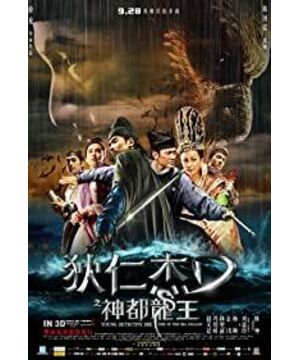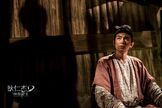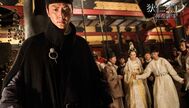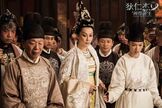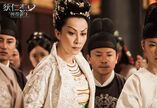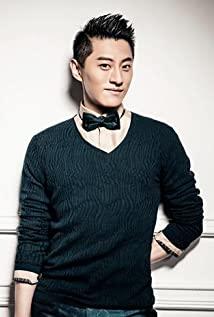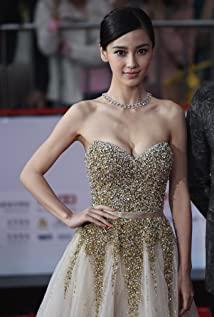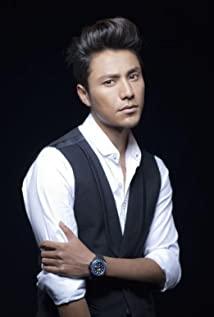But there are always people who disagree. This time it was Old Monster Xu who stood up.
Tsui Hark is a director who always surprises people. Whether it is "Shushan", "Seven Swords", or the 3D version of "Dragon Gate Flying Armor", he is always challenging new things and putting new wines in the old bottle of traditional kung fu. The Hong Kong-style kung fu film that started after the "wuxia craze" in Hong Kong in the last century has already faltered in the 21st century. The so-called only genre film unique to the Chinese film industry has become difficult. In the golden age of the booming Chinese film market, there are almost no kung fu films in the works that are constantly breaking box office records. This situation has made many filmmakers, especially big directors like Tsui Hark, who have almost become synonymous with Hong Kong-style martial arts, have to think about the future of this type of film.
In fact, the Di Renjie series is not Tsui Hark's first contact with detective subjects. As early as in his debut novel "Butterfly", Tsui Hark has already tried the combination of martial arts and reasoning and suspense. Under the influence of Gu Long's novel and the style of the film adaptations of Chu Yuan, Hong Kong martial arts movies were once popular with suspense elements, just like another great director To Qifeng used the same thing in his debut film "Clear Water Cold Sand Killing Gold". "Fusion Technology". But at least it shows that the old monster has already made up his mind about this kind of "you have me, I have you" type mix.
This time, Tsui Hark is not only combining martial arts and reasoning, but the giant beast in the sea and the resulting "China's first underwater 3D giant system" gimmick, clearly follow the routine of a sci-fi disaster film, while the poison and all kinds of super The medical methods of science and technology, especially the strange imperial doctor that Chen Kun subverted and performed, have a taste of fantasy and fairy tales. Of course, since the detective Di Renjie, who is famous all over the world for "The Case of Di Gong", is the protagonist, it's a bit of a waste to detect and reason not to override other elements. It's just that this so-called reasoning has really become the main feature and selling point of the film. It's a matter of opinion to become a not rigorous enough main line in the big scene where you sing and sing my debut. In short, no matter which genre is your favorite, as long as you watch this film, there will always be one that suits you.
Although this film can satisfy the tastes of many moviegoers, if it is split, it will leave a lot of regrets in every angle. As far as martial arts is concerned, this film does not have the cold and arrogant arrogance of the lonely smoke in the desert like "New Dragon Inn", nor the gorgeous Huaquan lotus steps like "Eastern Invincible", and even the "Seven Swords" that is not a success. , and also contributed Qing Jue Jue Zhuo's various weapons, which are more than one grade higher than the bland Weiya and CG special effects fights in this film. On the reasoning part, there are no bright spots. Although I didn't expect this film to contribute to the orthodox deduction and intellectual competition as orthodox reasoning, the clues came out inexplicably, and one by one far-fetched inferences were put forward, which made Di Renjie, who was so amazing at the beginning, all of a sudden. He has become a thug and a pharmacist, without the calmness and magic of a famous detective. Even though the easy chair detective is no longer in fashion, as a moviegoer hoping to get a kick out of suspense, I still have reservations about this shirtless approach.
Friends who have watched "The Detective Sherlock" can find that Tsui Hark has copied the Baker Street senior (of course, according to Di Renjie's seniority, he is a junior who can't be more junior) in terms of character relationship settings. ). It goes without saying that the detectives and doctors have a lot of love, and the bureaucratic case-solving experts in Dali Temple are very similar to Scotland Yard in London, which usually coexists with assistance and constraints. As for Di Renjie's passage of seeing through Sha Tuozhong's life experience and character at a glance, in terms of plot, effect and even the means of moving the mirror, it is like a frame-by-frame copy from Sherlock Holmes's basic deduction method. Of course, this is a kind of trick to satisfy the audience's selfish desires and the public psychology of watching the excitement, but this kind of frying behavior also makes people sigh whether Old Monster Xu is exhausted.
Another point of criticism is that the character building efforts in the film are really not enough. The male lead Di Renjie is omnipotent and omniscient. The Hajime giggled and behaved unruly, and suddenly he seemed to have become the L in "Death Note", so ruthless that he only lived in his own super-intelligent world. After watching the whole film, we can't see the human side of him, let alone a sense of substitution. In addition to the script design, I am afraid that Zhao Youting's performance must also take some responsibility. His usual dull facial expression and empty eyes are completely incomparable with Andy Lau's performance in the previous work, even if it is not Liu Tianwang's proud work. Feng Shaofeng's Yuchi Zhenjin can neither set off the aura of the protagonist in a low-key manner, nor can he make the robbery show brilliantly, which makes people sigh that this soy sauce has played a lot of scenes. Lin Gengxin's Sha Tuozhong's acting skills are inexperienced, and he did not play the role of the Chinese version of Watson, which is "holding the horns", and the corners of his eyebrows always remind people of the amorous Fourteenth Master, not the little doctor in the Dali Temple. The only bright spot is ANGELABABY. The alluring face, the alluring frown, even if such a stunner is a vase, it is a vase that can enhance the taste of the entire film.
In addition, there are so many BUGs in the historical and geographical details of the film that it makes people feel that it is not enough to describe it with a simple "dressing". If it wasn't for the alienation effect that the director deliberately created early, it can only be attributed to the shoddy style of Hong Kong films since the 1980s and 1990s. In short, if you use harsh words to complain, this film lacks spirit in terms of martial arts theory, lacks intelligence in reasoning theory, and lacks rigor and basic respect in terms of history.
Of course, although a lot of bad things have been said, the great success of the film at the box office naturally has its own success. Tsui Hark is such a director, no matter how disappointed we are with his work, we can always find surprises in it. That's what his gifted imagination gave him, the ability to paint all mundane things with beautiful colors. First of all, in terms of visual effects, the image style dedicated to the audience by the two Di Renjie is different from the more wild and rough Tsui Hark in the past, but more gorgeous and gorgeous. In the turbulent momentum as always, the director only needs to use a few large panoramas and CG special effects, and has already given the face of the gods of a glorious empire. The overall yellowish tone well outlines the luxury and sophistication of the Tang Dynasty. . The underwater fight scenes and the dynamic raging monsters, at least in Chinese-language films, are already a breathtaking visual experience.
Secondly, although the reasoning is not desirable, the film still achieves a high level in terms of the setting of the plot and the control of suspense. Starting from small incidents, breaking the cocoon layer by layer, and uncovering the big conspiracy, this is the classic routine of suspense films. And the many turns of the plot, although not thorough enough, also added fascinating waves. In particular, letting the villain "East Islanders" speak a language that is obviously close to Japanese, and the directional hints of various clues such as action and dressing, I am afraid that it is scratching the itch of many angry youths.
The biggest significance of this film is probably the twenty-three concept maps hidden in the end credits. The bizarre pictures evoke endless reverie. Apart from "Empire of Heaven" and "Dragon King of Shendu", if the remaining 21 fruits can be formed, it will undoubtedly be a great miracle for the Chinese film industry that lacks a series of movies. The "Di Renjie" series has already established word of mouth and mass foundation with two of Shang Jia's opening works, but if one is not careful, the flood of follow-up works and the roughness of the production schedule may destroy the original vitality of this series. . Next, what we can expect is that Tsui Hark will continue to surprise us.
View more about Young Detective Dee: Rise of the Sea Dragon reviews


